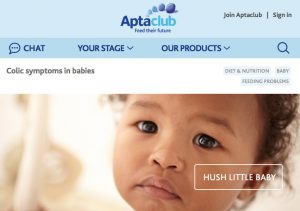Baby Milk Action’s new monitoring report profiling the major UK formula, bottle and teat companies and retailers provides evidence of how families are being misled.
Here are some reasons why better regulations are necessary to protect parents who use formula. Click here to support the campaign in Parliament.
The majority of mothers in the UK (88%) feed their babies with formula at some point before they are one year old. Independent information on these milks from NHS Choices and other experts is being contradicted by company marketing messages and product labels.
Unnecessary products (such as follow-on formula and milks for older babies) are being marketed for different age groups of babies and for supposed feeding problems using misleading health claims.
Are follow-on formulas necessary?
No. Infant formula is suitable for use from birth to 12 months of age when babies are not breastfed or receiving expressed or donor breastmilk. Milks marketed for other age groups are not required.
Formula companies make “follow on formula” which they market for babies from 6 months of age. This product is universally agreed to be unnecessary, and the World Health Organisation (WHO) says it may not be a healthy choice. It was invented to bypass the current regulations on promoting infant formula.

Nestlé advertises follow-on formula on television as providing the “Nutritional Foundation for Life”.
“Research shows that switching to follow-on formula at six months has no benefits for your baby. Your baby can carry on having first infant formula as their main drink until they are one year old.”
Are “growing-up” or “toddler” milks necessary?
No. Formula companies market fortified milks for children for use from one year of age (calling them “growing-up” or “toddler milks”), but UK health experts agree these are not needed. They are an unnecessary expense to families.
“When your baby is one year old, they can start to drink whole cows’ milk or sheep’s or goats’ milk (as long as it’s pasteurised).”
Are special formulas needed common feeding problems?
No. Companies medicalise infant feeding by promoting formulas they claim are specifically for “hungrier babies”, “reflux” or “colic and constipation”, for example, but have little proven benefit.
There are specific medical conditions where a doctor may prescribe a specialist formula. Parents should not self-diagnose and purchase a formula without taking independent medical advice.

Danone markets exactly the same Comfort milk powder in two brands in different packaging. Current prices in the Boots.com store (February 2017) are Aptamil Comfort £12.99 and Cow & Gate Comfort £11.50. A premium of £1.49 for the Aptamil name.
NHS Choices says regarding Comfort milks:
“This type of formula contains cows’ milk proteins that have already been partly broken down (partially hydrolysed). This is supposed to make it easier to digest and help prevent digestive problems like colic and constipation. However, there’s no evidence for this.”
How are companies allowed to contradict independent experts?
UK marketing regulations are weaker than in many other countries and are poorly enforced.
Some company claims to the public have been successfully challenged at the Advertising Standards Authority (ASA). However, this is a self-regulatory system that does not levy fines or require corrections to be published.
Further details on marketing practices and the need for better regulations will be available in our forthcoming monitoring report profiling the major formula, bottle and teat companies and retailers.
If you agree that independent information from the NHS and other independent sources should not be drowned out by misleading company marketing, please:
Report any marketing practices that concern you.
Is independent information available?
Yes. 100% of maternity facilities in Scotland and Northern Ireland are accredited to Unicef UK Baby Friendly Initiative standards, which requires health professionals to support families who formula feed. Facilities in England and Wales that are not yet accredited are working towards this.
Information about products is available to the public on the NHS Choices website and from regional health departments and from midwives and health visitors who support families.
Where can health workers find independent information?
All health professionals can freely access independent up-to-date information on the composition and safety of all infant formula, follow on formula and other milks marketed in the UK from the charity First Steps Nutrition Trust : www.firststepsnutrition.org
Staff in Baby Friendly facilities are trained to support families. A member of staff, or sometimes a multi-disciplinary committee, assesses information from companies on products to know what is on the market and to communicate any information health workers need. This is coordinated regionally in some places, as with the Local Infant Feeding Information Board (LIFIB) in the North West.
Is health worker independence at risk?
Yes. Currently companies produce materials for families and health professionals that is not “scientific and factual” as required by law. The First Steps Nutrition Trust publication “Scientific and Factual?” A review of breastmilk substitute advertising to health professionals shows just how misleading this information can be.
Company representatives are not allowed enter hospitals and other facilities to try to talk to staff about products, and so staff are targeted at conferences, online, through their professional associations and through training and educational prizes and grants.
Sign up for our email alerts for news of when our 2017 monitoring report is available.
